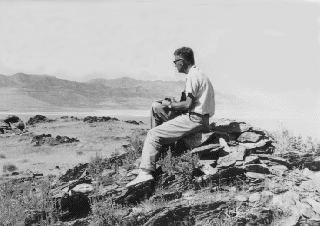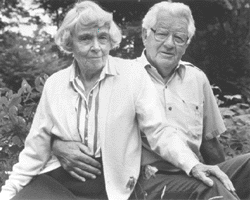Wallace Stegner Biography

Wallace Stegner once said about his writing, "In fiction I think we should have no agenda but to tell the truth." Stegner's prose has inspired generations of Americans to seek their own truth. In The Geography of Hope, A Tribute to Wallace Stegner, written by his friends, colleages, and his son, Page Stegner, we sense a far greater resonance than a mere collection of memorial applause. "It is a book about what one man has taught us, by his example, about the accountable life; a book about what it means to be a responsible, loving, thoughtful, constituent of the human race. That is the only way he would have it."
Wallace Stegner was born on February 18, 1909 in Lake Mills, Iowa. Over a 60 year career he wrote 30 books. Among the novels are, The Big Rock Candy Mountain, 1943; Joe Hill, 1950; All The Little Live Things, 1967 (Commonwealth Club Gold Medal); Angle of Repose, 1972 (Pulitzer Prize); The Spectator Bird, (National Book Award), 1977; Recapitulation, 1979; Collected Stories, 1990, and Crossing to Safety, 1987. The nonfiction includes Beyond the Hundredth Meridian, 1954; Wolf Willow, (A History, A Story, and a Memory of the Last Plains Frontier), 1962; The Sound of Mountain Water, 1969; Where the Bluebird Sings to the Lemonade Springs: Living and Writing in the West, 1992, a collection of essays that earned him a nomination for the National Book Critics Circle award.
Although Wallace Stegner is called "the dean of Western writers," not all of his fiction is laid in the West. One of his most successful novels, Crossing to Safety takes place in Wisconsin and Vermont. The Spectator Bird is in California and Denmark. All The Little Live Things is pure California, not typically Western. Many of his short stories have a variety of settings: Vermont, Egypt, the South of France, as well as the American West. His non-fiction, however, and one of his most eloquent statements about the environment, The Wilderness Letter, are definitely Western. His impact, historically and environmentally, is Western.
Wallace Stegner wrote about the need to preserve the West, and he also fought for it. He became involved with the conservation movement in the 1950's while fighting the construction of dam on the Green River at Dinosaur National Monument. In 1960 he wrote his famous Wilderness Letter on the importance of federal protection of wild places. This letter was used to introduce the bill that established the National Wilderness Preservation System in 1964. Wallace Stegner also founded the Committee for the Green Foothills in Santa Clara County, California and was involved with The Sierra Club and Wilderness Society. He also served as assistant to the Secretary of the Interior, Stewart Udall, during the Kennedy administration. There, he worked on issues dealing with the expansion of National Parks. His passion about the need to protect our wild places, and his respect for our landscape are a themes that Mr. Stegner eloquently expresses in many of his books and essays.
In 1964 Stegner started the Creative Writing Program at Stanford University, where he served on the faculty until 1971. He also taught at University of Utah, University of Wisconsin, and Harvard University. His students include: Wendell Berry, Larry McMurtry, Thomas McGuane, Ernest Gaines, John Daniel, Raymond Carver, Edward Abbey, and Poet Laureate of the United States, Robert Haas. Mr. Stegner has twice been a Guggenheim Fellow and a Senior Fellow of the National Endowment for the Humanities. He was a member of the National Academy of Arts and Sciences and of the National Academy of Arts and Letters. In 1992 he turned down the National Medal for the Arts because he was "troubled" by the political controls placed upon the  National Endowment for the Arts. In 1934, Stegner married Mary Stuart Page. For 59 years they shared a "personal literary partnership of singular facility," wrote Arthur Schlesinger, Jr. The dedication of Stegner's last book Where The Bluebird Sings to the Lemonade Springs, reads "For Mary...who, like Delsey has seen the first and the last, and been indispensable and inspiriting all the way." They have a son, Page Stegner who is also a writer and professor at University of California, Santa Cruz.
National Endowment for the Arts. In 1934, Stegner married Mary Stuart Page. For 59 years they shared a "personal literary partnership of singular facility," wrote Arthur Schlesinger, Jr. The dedication of Stegner's last book Where The Bluebird Sings to the Lemonade Springs, reads "For Mary...who, like Delsey has seen the first and the last, and been indispensable and inspiriting all the way." They have a son, Page Stegner who is also a writer and professor at University of California, Santa Cruz.
Mr. Stegner died at 84, on April 13, 1993 following an auto accident in Santa Fe, New Mexico. He left a legacy as writer, professor, and environmentalist that once moved Edward Abbey to pronounce him "the only living American writer worthy of the Nobel." Indeed, Stegner was one of the American West's preeminent historians and arguably the most important of its novelists.
James Hepworth
The Quiet Revolutionary
THE WILDERNESS LETTER From "Coda: Wilderness Letter," copyright by Wallace Stegner, 1960.
Something will have gone out of us as a people if we ever let the remaining wilderness be destroyed; if we permit the last virgin forests to be turned into comic books and plastic cigarette cases; if we drive the few remaining members of the wild species into zoos or to extinction; if we pollute the last clean air and dirty the last clean streams and push our paved roads through the last of the silence, so that never again will Americans be free in their country from the noise, the exhausts, the stinks of human and automotive waste. And so that never again can we have the chance to see ourselves single, separate, vertical and individual in the world, part of the environment of trees and rocks and soil, brother to the animals, part of the natural world and competent to belong in it. Without any remaining wilderness we are committed wholly, without chance for even momentary reflection and rest, to a headlong drive into our technological termite-life, the Brave New World of a completely man-controlled environment. We need wilderness preserved-- as much of it as is still left, and as many kinds-- because it was the challenge against which our character as a people was formed. The reminder and the reassurance that it is still there is good for our spiritual health even if we never once in ten years set foot in it. It is good for us when we are young, because of the incomparable sanity it can bring briefly, as vacation and rest, into our insane lives. It is important to us when we are old simple because it is there–important, that is, simply as idea.